Nagaland Pollution Control Board assesses solid waste management, air quality at ongoing Hornbill festival
The Nagaland Pollution Control Board (NPCB) has undertaken a comprehensive assessment of solid waste management and air quality during the ongoing Hornbill Festival in Kisama.

- Dec 07, 2023,
- Updated Dec 07, 2023, 4:33 PM IST
The Nagaland Pollution Control Board (NPCB) has undertaken a comprehensive assessment of solid waste management and air quality during the ongoing Hornbill Festival in Kisama.
This marks the first instance of such an initiative by the NPCB, including the deployment of Respiratory Dust Samplers (RDS) at Naga Heritage Village Kisama.
Source said that the primary objective of this endeavor is to examine and raise awareness among both the government and the public.
"The NPCB is actively quantifying waste, analyzing its composition, and assessing the characteristics of solid waste generated during the Hornbill Festival. Respiratory Dust Sampler machines have been strategically placed in key areas such as the main arena and the bamboo pavilion, with real-time monitoring of noise levels also incorporated. Initial findings indicate that over 700 kg of solid waste, encompassing plastics, pet bottles, cans, and food waste, was generated on the first day, escalating to an estimated 3000 kg on the second day", said a source.
He said that the food waste emerges as the predominant component, closely followed by plastics. The quantity of waste has shown an increasing trend since day three, with NPCB staff and laborers from neighboring villages diligently segregating the waste from 6:30 AM to 5:30 PM daily.
In terms of air quality, the assessment reveals that the air at Kisama exceeds the permissible limit of 100 micrograms per meter cube, indicating high pollution levels. Notably, the NPCB has expanded its air monitoring stations to seven locations in Dimapur and four in Kohima, with plans for further expansion. Additionally, air monitoring machines have been installed in select districts, set to become operational soon.
Also read : Assam: Supreme Court seeks data from Union Government on illegal migration post-1971